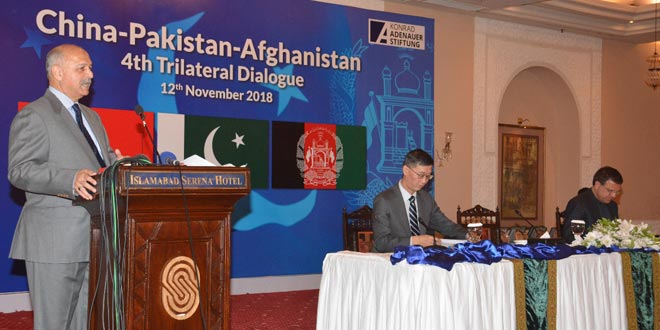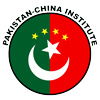Pakistan-Afghanistan-China Trilateral Dialogue supports CPEC as key to peace and regional cooperation
Source : PCI Date : 12-11-2018
 |
|
|
Islamabad: Pakistan-China Institute (PCI) hosted the 4th Trilateral Dialogue between China-Pakistan-Afghanistan on Monday 12th November, at Serena Hotel, Islamabad. The dialogue was organized under the theme of Economics, Culture and Connectivity in the light of CPEC. The key note speeches were delivered by Yao Jing, Ambassador of China to Pakistan, and Omar Zakhilwal, Ambassador of Afghanistan to Pakistan. The event was largely attended by representatives of think-tanks, university professors, students, parliamentarians and media personnel.
The inaugural speech was given by the Chairman of the Pakistan-China Institute and the Chairman of Senate Foreign Affairs Committee, Senator Mushahid Hussain Sayed who addressed the audience saying, “21st century is the Asian Century, with a decline of the West, and the Greater South Asia has emerged as a geo-economic concept, driven by economy and energy, roads and railways, and ports and pipeline, and Pakistan is the hub of this connectivity due to CPEC.” He further added that CPEC is not only about Pakistan and China, rather it is about regional connectivity, and Afghanistan is a natural partner in CPEC’s expansion. Senator Mushahid Hussain Sayed further stressed that our focus should be culture, corridors and connectivity rather than conflict or confrontation.
Hazrat Omar Zakhilwal, Ambassador of Afghanistan to Pakistan, while giving the key note speech, discussed that there is a lack of understanding in terms of development as the major bilateral relations as well as multilateral relationships between the countries are based on security rather than economic development. He further stated, as an Economist by profession, that he believes that there must be a line drawn between economics and politics in order for all partners to integrate in regional connectivity. The Ambassador said that Afghanistan supports CPEC and its expansion into Afghanistan as it will further develop the country internally as well as strengthen the international relations of the countries in the region.
Ambassador of China, Yao Jing, during his key note speech at the dialogue highlighted the inclusive nature of BRI and CPEC and stressed that all the countries in the region should have a similar chance of availing opportunities. He further added that Afghanistan has a geographical importance as it is a bridge that connects East Asia with West Asia. He stressed that China is playing its part in facilitating peace in Afghanistan.
The 4th Trilateral Dialogue was inclusive of three detailed panel discussions namely, BRI/CPEC and potential for cooperation between Afghanistan and Pakistan, Regional Connectivity through the Cultural Corridor and the Way Forward. The panel comprised of high profile speakers who provided their valuable input to the discussion. The speakers were inclusive of Mr. Mirwais Yasini, Member Parliament Afghanistan, Dr. Chen Wenling, Chief Economist of China Center for International Economic Exchanges (CCIEE), Mr. Afrasiab Khattak, Former Senator, Professor. Li Xiguang, Scholar from Tsinghua University, Lt. Gen (Retd.) Asad Durani, Ex-DG ISI, Mr. Murtaza Solangi, Senior Journalist, and Mr. Mohammad Iqbal Azizi, Former Provincial Governor of Lughman and Lugar provinces of Afghanistan.
The closing remarks were provided by Mustafa Hyder Sayed, Executive Director of PCI who said that the common thread from today’s dialogue is that we need to connect culturally, enhance trade and engage in a constructive dialogue. He further added that we need to go beyond the prism of proxies and geopolitics and participate in connectivity and regional cooperation.
Dialogue was organized in collaboration with Konrad-Adenauer-Stiftung (KAS) and a packed audience patiently listened to all the speakers. The dialogue ended with an interactive question and answer session.

